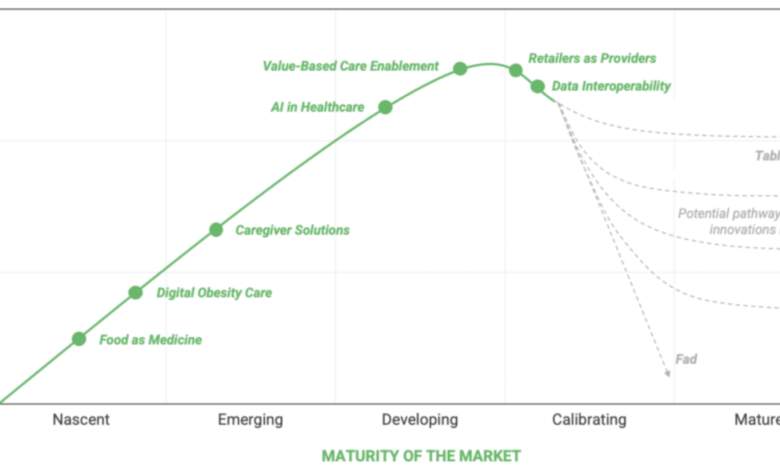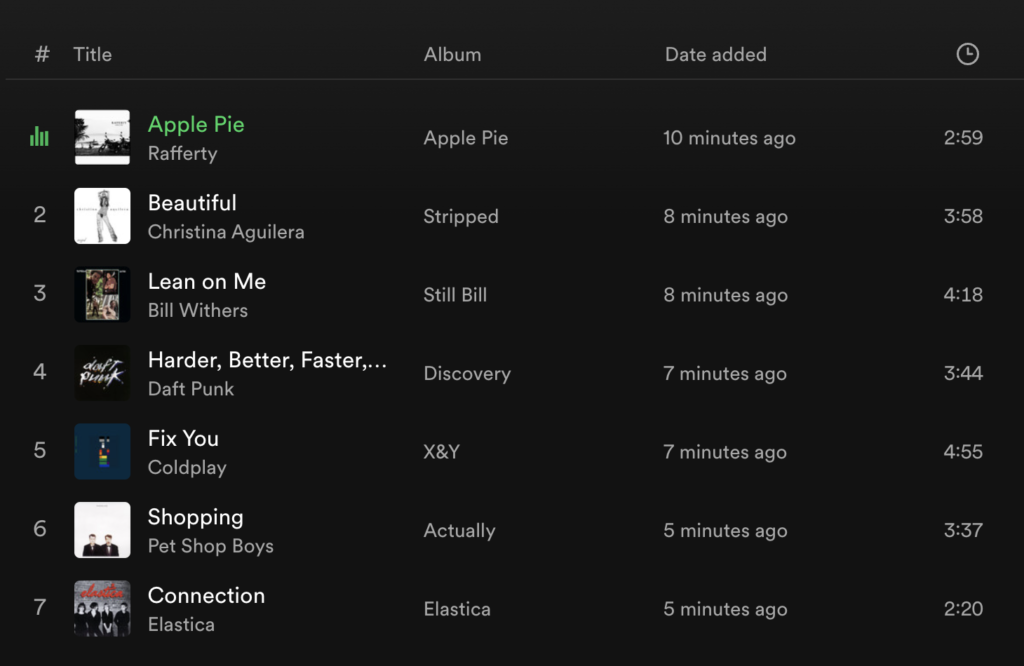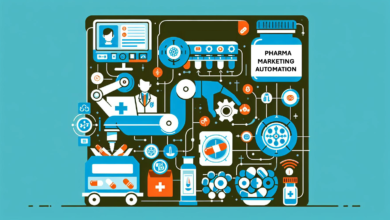2024 Outlook: Leveraging Emerging Digital Health Trends in Pharmaceutical Marketing

Rock Health recently posted an excellent summary of the key digital trends they are seeing heading into 2024. Using the classic Hype Curve model, they plotted the relative maturity of each trend and offered details behind these driving forces. For pharma marketers across every therapeutic category, these trends hold a number of important marketing implications. It turns out AI is not the only trend impacting healthcare. Let’s dive in! (Read to the end for a unique holiday gift!).
1. Food as Medicine
- Trend Overview: This trend encompasses the growing use of digital platforms to deliver nutritional advice tailored to specific health conditions, expanding beyond niche markets like type 2 diabetes to include a broader range of conditions, including cancer and mental health disorders. The NIH has earmarked substantial funding for nutritional research, recognizing the integral role of diet in health and disease management. The trend is marked by a surge in policy shifts, research activities, and innovations in the digital health space.
- Marketing Implications: Although this trend is still early on the curve, pharmaceutical companies can align their marketing strategies with this trend by collaborating with nutrition-focused digital services. Marketing campaigns can showcase how their medications, when combined with specific dietary recommendations, can enhance health outcomes. This approach not only positions the brand as holistic and patient-centric but also taps into the growing consumer interest in preventive healthcare.
2. Digital Obesity Care
- Trend Overview: The digital obesity care sector has seen substantial growth, characterized by an increase in digitally-enabled weight management services like remote monitoring and lifestyle coaching. This trend aligns with the growing need for comprehensive obesity care that addresses both the physical and mental aspects of weight management. The sector has attracted significant investment, indicating its potential for further expansion and innovation.
- Marketing Implications: Pharma brands should develop digital marketing strategies that highlight the comprehensive nature of their obesity care products. Emphasizing how their treatments integrate with digital support tools can help build a narrative of holistic care. Additionally, creating educational content around the multifaceted approach to obesity management can help position the brand as a leader in this evolving care model.
Many companies have already been actively involved in addressing obesity through medication and digital care initiatives. Not only are Novo Nordisk and Eli Lilly developing digital tools to support their weight loss products, but companies like Teladoc, Everly Health, and Ro are working in the opposite direction, incorporating GLP-1 medications into their digital weight management programs, highlighting the integration of pharmaceutical treatments with digital care for obesity management
3. Caregiver Solutions
- Trend Overview: With an increasing number of people taking on caregiving roles, there’s a growing demand for digital solutions that support caregivers of the elderly, children, and those with illnesses or disabilities. The economic value of unpaid caregiving has significantly increased, highlighting the need for innovative solutions to alleviate caregiver burden. This emerging trend is supported by both state and federal initiatives and has seen a notable increase in related digital interventions.
- Marketing Implications: Pharmaceutical marketing campaigns can be tailored to target caregivers, offering tools and resources that simplify medication management and provide valuable support. By creating content that resonates with the challenges caregivers face, pharma brands can build stronger relationships and establish themselves as supportive partners in the caregiving process.
4. AI in Healthcare
- Trend Overview: AI in healthcare is rapidly advancing, with applications ranging from patient triage to drug discovery. The significant investment in AI startups and the growth in partnerships signal a shift towards more integrated AI solutions in healthcare. However, this trend also faces challenges around data ethics and algorithmic bias, making it a complex yet promising field.
- Marketing Implications: Pharma companies can utilize AI to create personalized marketing strategies, harnessing data to tailor messages to specific patient demographics. AI can also be employed to predict market trends and optimize marketing campaigns, providing a competitive edge in a data-driven market. New, voice-driven AI chat tools and immersive experiences can allow KOLs and other thought leaders to “appear” on demand in various clinical and commercial settings.
5. Value-Based Care Enablement
- Trend Overview: Value-based care focuses on outcomes rather than services rendered, emphasizing risk-based business models and patient engagement in care. This trend has been gaining momentum, with tech companies developing solutions to facilitate the adoption of value-based care models. The increasing interest in this sector is evident from the growth in investments and strategic partnerships.
- Marketing Implications: Marketing strategies in the pharma sector should pivot to highlight the effectiveness and value of their products within these care models. Showcasing real-world outcomes and patient success stories can help pharmaceutical brands align with the value-based care philosophy, emphasizing their commitment to patient outcomes.
Highlighting this trend, Alnylam Pharmaceuticals and Novartis have been exploring innovative contracts aligned with value-based care. Alnylam is seeking contracts with payers for their drug Patisiran, which treats hATTR amyloidosis, while Novartis announced a similar move with their cellular therapy for blood cancer, Kymriah.
6. Retailers as Providers
- Trend Overview: Retail giants are increasingly venturing into healthcare provision, offering services in chronic disease management and primary care. This trend is marked by new entrants in the market and the expansion of existing players, indicating a shift towards more integrated and accessible healthcare services within the retail sector.
- Marketing Implications: Pharmaceutical companies can explore collaborative marketing efforts with these retailers, emphasizing the accessibility and convenience of their products in retail healthcare settings. This approach can open new distribution channels and direct engagement opportunities with patients.
7. Data Interoperability
- Trend Overview: Data interoperability in healthcare focuses on the seamless exchange and use of health information across different systems. This trend is driven by the need for accurate, secure, and comprehensive health data to improve patient care. With substantial investments in this area, there’s a clear move towards more advanced and interconnected data infrastructures.
- Marketing Implications: For pharmaceutical marketing, leveraging interoperable data can provide deeper insights into patient behaviors and preferences, enabling more effective and targeted marketing strategies. Although data is further along the maturity curve than other trends, there is still much room for improvement, especially when it comes to customer data. Compliance, accurate HCP and patient data, and prioritizing digital identity will be the keys for driving faster campaign engagement and activation across all areas of the enterprise.
In summary, while AI holds incredible potential, Digital Health continues to move forward with incredible speed and energy across many different trend lines. Whether it’s Food as Medicine, Caregiver Solutions or Data Interoperability, in 2024 these and many other emerging digital trends will unlock powerful new opportunities for pharma marketers in every organization!
If you’ve made it this far, thank you for your time and attention!
Here is a special holiday gift – the world’s only 2024 Digital Health Playlist! on Spotify!
It actually turned out pretty good if we do say so ourselves. 🙂
Song choice rationale below!

Food as Medicine:
- Song: “Apple Pie” by Rafferty
- Why: This song playfully uses food metaphors, fitting well with the concept of food being used as a form of medicine or health.
Digital Obesity Care:
- Song: “Beautiful” by Christina Aguilera
- Why: The song’s message about self-acceptance and inner beauty aligns with the compassionate approach needed in addressing obesity and health.
Caregiver Solutions:
- Song: “Lean On Me” by Bill Withers
- Why: This classic emphasizes support and togetherness, reflecting the essence of caregiver support systems.
AI in Healthcare:
- Song: “Harder, Better, Faster, Stronger” by Daft Punk
- Why: The song’s futuristic sound and lyrics about improvement and efficiency resonate with the innovative and progressive nature of AI in healthcare.
Value-Based Care Enablement:
- Song: “Fix You” by Coldplay
- Why: The song’s themes of healing and care align well with the goals of value-based healthcare, which focuses on patient outcomes and holistic care.
Retailers as Providers:
- Song: “Shopping” by Pet Shop Boys
- Why: While the song is more about consumerism, its upbeat tone and reference to shopping can metaphorically align with the trend of retailers stepping into healthcare provision.
Data Interoperability:
- Song: “Connection” by Elastica
- Why: The title and lyrics emphasize connectivity and coming together, paralleling the idea of integrating and sharing healthcare data across systems.





